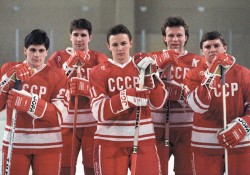Cinema | April 8th, 2015

Gabe Polsky’s “Red Army” skates by as swiftly and forcefully as the larger-than-life hockey personalities it closely examines.
Flipping the American “Miracle on Ice” narrative on its head, Polsky’s sharp, attentive documentary invites viewers to see the dominant Cold War rink soldiers of the Soviet Union’s national team not as Ivan Drago-esque automatons, but rather as hard-working young men just as proud of their country as the kids who played for Herb Brooks on Team USA.
Polsky, a former collegiate hockey player, laces his movie with humor and heart, smartly using the sport as a way to tell a much grander story about life behind the Iron Curtain.
“Red Army” is anchored by the presence and participation of Viacheslav “Slava” Fetisov, the supremely talented defenseman who collaborated with Alexei Kasatonov, Igor “The Professor” Larionov, Vladimir “The Tank” Krutov and Sergei Makarov as the Russian Five, a unit so in tune, multiple witnesses described the quintet as a functional “single brain.” Other great players, most notably the superb goalie Vladislav Tretiak, appear, but Polsky knows he has a ringer in Fetisov and builds the narrative around him.
One of the movie’s key conflicts is a tale of two coaches: the beloved Anatoli Tarasov and the despicable Viktor Tikhonov.
Polsky presents Tarasov as a cultured, innovative nurturer who introduced ideas, movements, and strategies from ballet and chess to enhance the already formidable skills of his players. To the dismay of the team, however, Tarasov was replaced by the stern taskmaster Tikhonov, a humorless military officer who ran the squad with no mercy.
Later, following Fetisov’s separation from the team in the late 1980s, Polsky includes footage of Fetisov training once again under Tarasov. Those images, like the rest of the incredible archival material selected by Polsky, add layers of richness and depth.
One of Polsky’s smartest moves takes place following the establishment of Fetisov’s disdain for Tikhonov. Gorbachev’s glasnost and perestroika policies opened up opportunities for Russians to play professionally for the National Hockey League, but Fetisov’s outspokenness and renegade attitude angered the wrong decision-makers, and a chance to play for the New Jersey Devils was denied by the Russian government. The inclination of the American viewer is to react with indignation at Fetisov’s plight. Eventually, Fetisov does come to America, but Polsky surprises us by sharing Fetisov’s disappointment in the NHL’s sloppy, undisciplined style of me-first play and emphasis on the star versus the whole team.
Some hockey lovers have wondered why Polsky doesn’t spend more time in the film on the rivalry between the Red Army and Canada, although Wayne Gretzky does show up briefly in a clip following the Soviet Union’s 8-1 win in the 1981 Canada Cup final.
The reality, however, for those with little interest in the game, is, as Polsky noted in an interview with James Hughes for “Grantland,” that “the Soviet legacy in North America in the 80s was the Miracle loss…” That the filmmaker so incisively and empathetically uses what was for America a validating triumph and for the Soviets a shocking disappointment to frame such a warm, expansive and unexplored tale, is itself a small miracle.
March 2nd 2026
February 23rd 2026
February 23rd 2026
February 16th 2026
February 16th 2026

_(1)__293px-wide.png)
_(1)__293px-wide.jpg)


